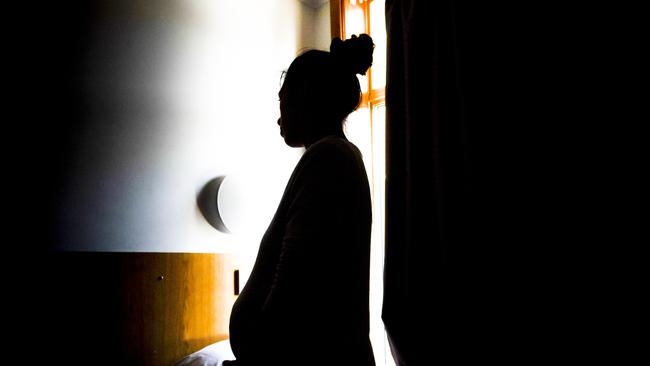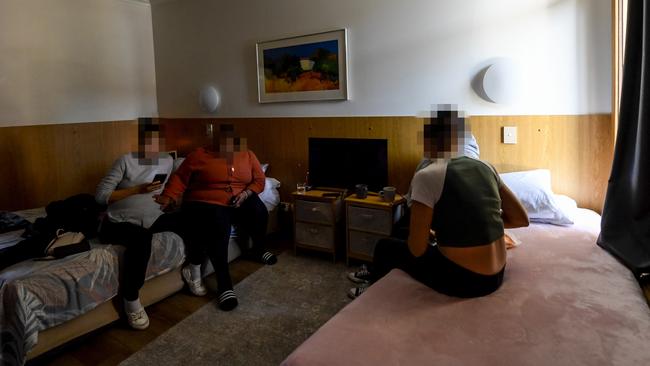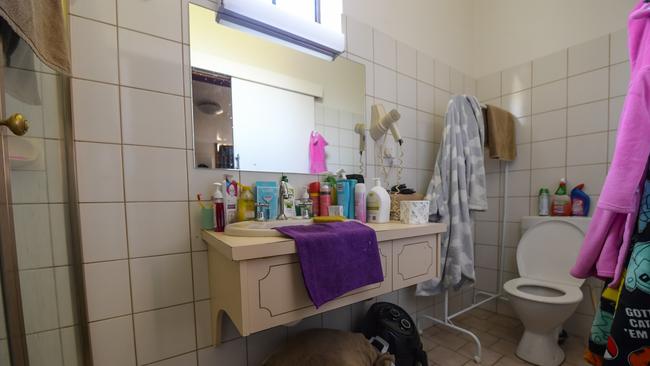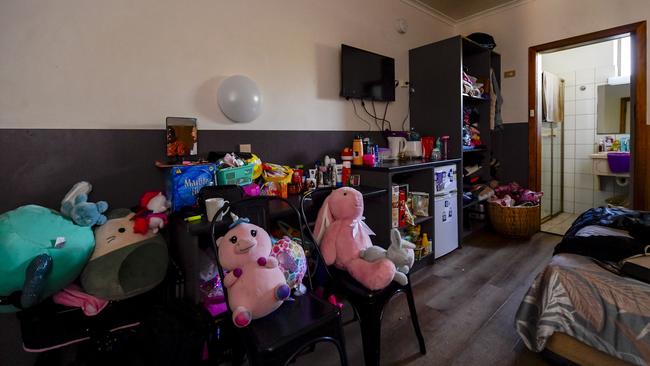Heartbreak Hotel: A troubled 28-year-old says she has been told to come up with an “exit plan” from her emergency accommodation
Facing eviction from her emergency accommodation a 33-week pregnant woman doesn’t know if she’ll have a roof over her head by the end of the week.
SA News
Don't miss out on the headlines from SA News. Followed categories will be added to My News.
At 33 weeks’ pregnant, Lily doesn’t know if she’ll have a roof over her head by the end of the week.
The troubled 28-year-old says she has been told to come up with an “exit plan” from the emergency accommodation she, her partner, seven-year-old son and five-year-old daughter have called home for the last three months.
“We have nowhere to go,” says a tearful Lily, who escaped family violence and couch-surfed at friendly homes before moving into the tiny motel room earlier this year.
“I don’t know if I’ll have a roof over my head when the baby arrives. It’s very stressful.”
Lily is not alone in her distress at the inner-city motel, which its residents liken to “living in a ghetto in America”.

The 42-room motel is full every night. Behind each door is a dark, cramped space used for sleeping and living. Most rooms have no kitchen. Dishes are washed in a tiny sink in a bathroom that is barely wide enough for stretched arms.
Homeless South Australians are being forced to live in these conditions for months on end.
This is the brutal reality of a crippling housing crisis complicated by the devastations of domestic violence. Two epidemics that have created a “depressing” reality for struggling mothers and their families.
Vanessa, who fled her violent home in Perth late last year, wrestles with the constant dread that she will be moved on with nowhere to go.
Each week, the 37-year-old – just like all her homeless friends living in emergency accommodation – has to make 10 applications for rental properties and attend 10 open inspections in a rental market where availability is just 0.5 per cent.
She says if she fails to send through photographic evidence of her applications and property visits to her Anglicare case worker – or medical certificates to explain her inability to complete that task – she risks being kicked out of her emergency accommodation.
“It makes you depressed,” says Vanessa, whose place at the motel is only guaranteed on a week by week basis.

“I went to a house inspection at Northfield. The agent said ‘do you work’ and asked what money I receive. When I said Centrelink, she started giggling in my face. She laughed at me, I felt so hurt and embarrassed.
“Every inspection, there’s so many people there. We don’t have a chance ... we’re just wasting our time.”
Vanessa and her two children, aged five and seven, have called their cramped motel room home since February. The single room has two beds, a squeezy bathroom and no kitchen. The children’s teddies are crammed into corners next to carefully arranged tins and packets of food and neat piles of clothes.
Vanessa has bought an air fryer to cook with but she’s forced to keep it in the bathroom for lack of space and electrical plugs. The room has a microwave, toaster and minibar fridge that only has enough space to keep a couple of days worth of food.
The lack of storage and fridge space means the weekly food budget blows out with ready meals and takeaways.
She has to “self-fund” $270 out of her Centrelink payments for two nights of emergency accommodation every fortnight.

Every couple of days, Vanessa’s case worker needs to sight her children.
“I’m basically on edge,” says Vanessa, who is already dealing with the mental anguish of being a single mother who has escaped a violent home.
“My little son has gone through a bit of depression, he suffers anxiety. It’s sad living like this. We survive by sticking together.”
Vanessa’s cousin, Dijana, who has stayed at the motel in the past, is now living in a Housing SA home in Seaton. The property is in a state of disrepair, with holes in the floors, boarded-up windows and leaking taps.
“They say it’s not Seaton, it’s Satan,” the 37-year-old says.
The 28-year-old had been renting in Royal Park for two years until her landlord raised the $450-a-week rent by $100. They now pay $300 a week for their one-room motel accommodation.

After making scores of applications, Kylie has finally secured a three-bedroom home to rent in Findon and will move in less than a week.
“I had to go to 40-plus inspections and trying to get kids around on top of that before we managed to get a lease,” says Kylie, whose partner works as a scaffolder.
The women agree that despite its many limitations, their inner-city motel is better than any locations in the city. They say conditions at other motels being used for emergency accommodation are “scary”. A spokesperson for the SA Housing Authority said people in emergency accommodation were “given assistance to look and apply for properties that they can afford to rent” and were offered financial assistance for costs such as bond.





